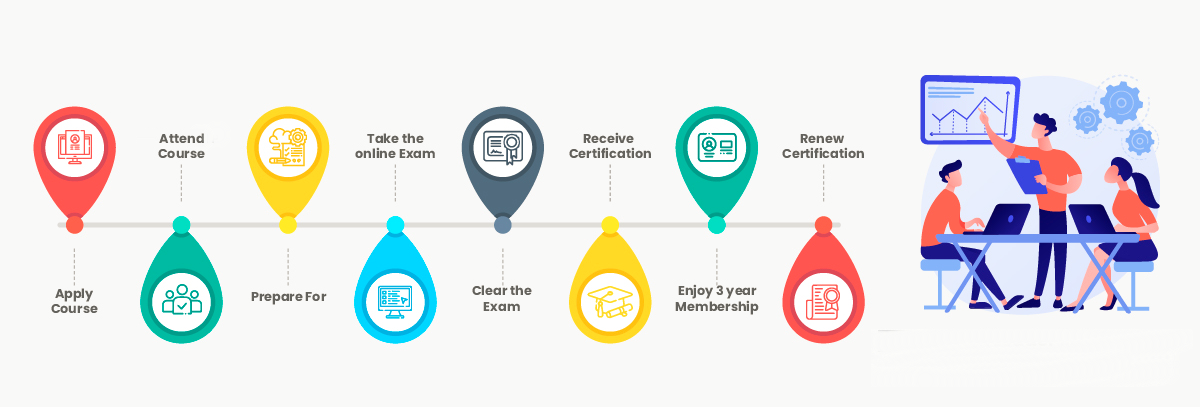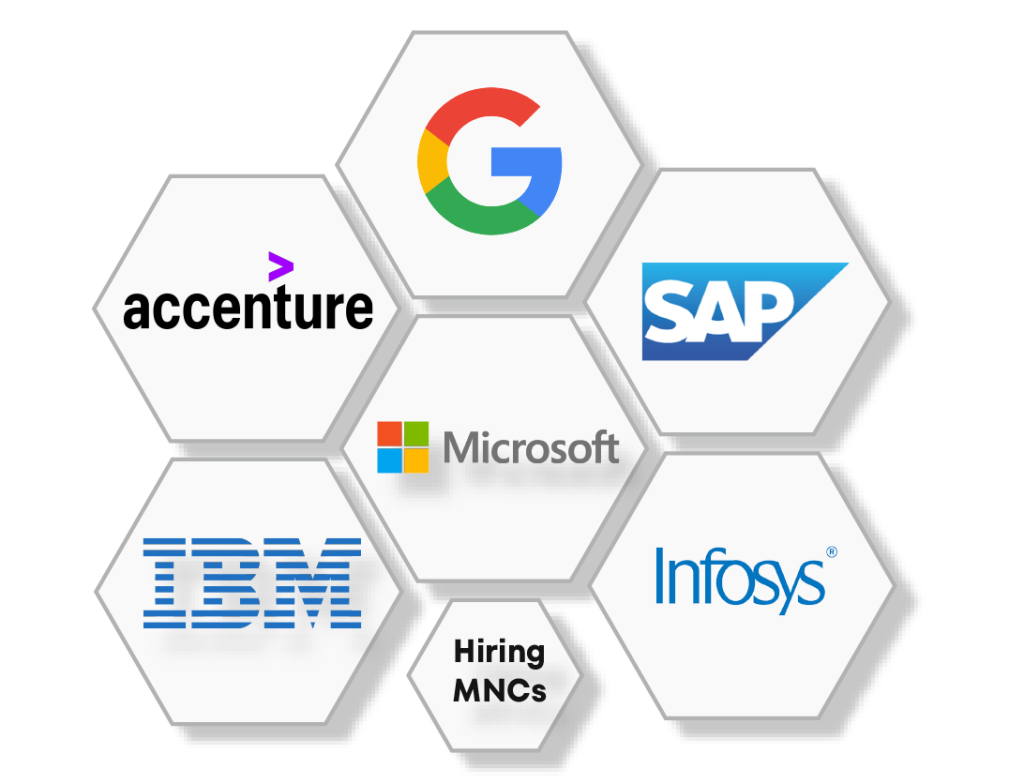
There is an increasing demand for SQL proficiency in various fields like web development, programming, data analysis, and reporting. To equip you with all the necessary skills to work efficiently with SQL databases and integrate them into your applications, Education Nest offers an SQL certification course. The course content is presented in a simplified manner, and the experienced instructor will guide you in understanding the basic principles. You will gain expertise in optimizing your database structure, creating efficient SQL statements and clauses, and managing your SQL database for scalable growth. You will gain expertise in this area after completing the course.
Application Deadline: Jun 30, 2023
Upskill for Your Dream Job
Sambodhi and Education Nest, offers a comprehensive SQL training course. With live project-based training and guidance from 10+ years experienced industry experts, you will learn how to manage and manipulate relational databases using SQL. This course covers the basics of SQL as well as advanced topics such as stored procedures, triggers, and functions. By the end of the course, you will have the knowledge and practical experience needed to develop database applications. Join Sambodhi and Education Nest today to enhance your SQL skills and boost your career prospects.



Instructor-led SQL live online Training Schedule
May 15th – Weekend
July 1st – Weekend
Why enroll for SQL Certificate Training Course?

The BLS predicts a 10% growth in employment for database administrators, including SQL developers, with 13% in MNCs from 2019 to 2029.

SQL is a key skill for MNCs to enable data-driven decision-making Organizations such as JP Morgan Chase, UnitedHealth Group, Amazon, Walmart, and the U.S. government require SQL developers.

SQL Developer salaries vary from $50,000 to $120,000 per year. BLS data states the median annual salary as $98,860, with a projected 10% job growth rate.

SQL Training Course Benefits
SQL is a vital skill for numerous job positions in various industries such as web development, data analysis, business intelligence, and more. Enrolling in SQL training enables you to gain the expertise required to enhance your career in these fields. Despite being an old language, SQL continues to hold high significance today since companies worldwide collect enormous amounts of data for growth. SQL consistently ranks among the top most-requested tech skills, and acquiring proficiency in it can add significant value to your skill set.

Annual Salary

Hiring Companies
Want to become a Database
Professional?
Why SQL Certificate Training Course from Education Nest






SQL Programming Skills Covered
SQL Training Course Syllabus
SQL Training Projects

SQL projects in the retail industry can range from simple data management tasks to complex analysis and reporting. Examples of SQL projects in the retail industry include tracking inventory levels, managing product information, and analyzing customer behavior. Other projects might involve sales forecasting, tracking customer purchase history, or analyzing trends in market demand. With SQL, retailers can also optimize pricing strategies, manage supply chains more effectively, and identify opportunities for growth. Retailers may also use SQL to build custom reporting dashboards, enabling them to gain real-time insights into critical business metrics such as sales performance, customer retention rates, and inventory levels.

SQL projects are an essential part of the IT industry. Companies rely on SQL to manage and manipulate their relational databases, allowing them to store and analyze vast amounts of data. Common SQL projects in the IT industry include creating and maintaining databases, designing and implementing database applications, developing stored procedures and triggers, optimizing database performance, and ensuring data security. SQL is also widely used in business intelligence and data warehousing projects, where it is used to extract, transform, and load large amounts of data. Overall, SQL is a critical tool for the IT industry, and proficiency in SQL is highly valued by employers.
SQL Training Description
SQL (Structured Query Language) is a programming language used to manage and manipulate relational databases. A SQL course teaches students how to create and modify databases, query data, and manage database objects such as tables, views, and indexes. The course covers fundamental SQL concepts such as SELECT statements, data filtering, sorting, and grouping, as well as more advanced topics such as stored procedures, triggers, and functions. Students learn how to write efficient and effective SQL code, and how to optimize database performance. A SQL course is an essential prerequisite for anyone seeking a career in data analysis, database administration, or software development.
The objectives of a typical SQL course may include:
Overall, the goal of a SQL course is to equip students with the knowledge and skills required to manage and manipulate relational databases effectively.
There are several reasons why learning SQL is beneficial, including:
Overall, learning SQL is a worthwhile investment for anyone interested in working with data and pursuing a career in the IT industry.
A SQL course is suitable for anyone who wants to gain a solid understanding of relational databases and how to manage and manipulate them using SQL. Specifically, the following groups of individuals may benefit from a SQL course:
Overall, a SQL course is suitable for anyone who wants to develop their database management and querying skills, and who wants to gain a competitive edge in the job market.
The prerequisites for a SQL course may vary depending on the level and complexity of the course. However, some common prerequisites for a basic SQL course may include:
It’s important to note that while these are common prerequisites for a basic SQL course, some advanced SQL courses may require more in-depth knowledge of programming or database concepts. Additionally, some courses may require specific software or tools to be installed on the student’s computer. It’s always best to check the course requirements before enrolling.
There are several popular software tools and systems for database management, including:
Overall, these software are widely used in the IT industry for managing and manipulating data, and each has its own strengths and weaknesses depending on the specific use case.
SQL (Structured Query Language) is a programming language used to manage and manipulate relational databases. A SQL course teaches students how to create and modify databases, query data, and manage database objects such as tables, views, and indexes. The course covers fundamental SQL concepts such as SELECT statements, data filtering, sorting, and grouping, as well as more advanced topics such as stored procedures, triggers, and functions. Students learn how to write efficient and effective SQL code, and how to optimize database performance. A SQL course is an essential prerequisite for anyone seeking a career in data analysis, database administration, or software development.
The objectives of a typical SQL course may include:
Overall, the goal of a SQL course is to equip students with the knowledge and skills required to manage and manipulate relational databases effectively.
There are several reasons why learning SQL is beneficial, including:
Overall, learning SQL is a worthwhile investment for anyone interested in working with data and pursuing a career in the IT industry.
A SQL course is suitable for anyone who wants to gain a solid understanding of relational databases and how to manage and manipulate them using SQL. Specifically, the following groups of individuals may benefit from a SQL course:
Overall, a SQL course is suitable for anyone who wants to develop their database management and querying skills, and who wants to gain a competitive edge in the job market.
The prerequisites for a SQL course may vary depending on the level and complexity of the course. However, some common prerequisites for a basic SQL course may include:
It’s important to note that while these are common prerequisites for a basic SQL course, some advanced SQL courses may require more in-depth knowledge of programming or database concepts. Additionally, some courses may require specific software or tools to be installed on the student’s computer. It’s always best to check the course requirements before enrolling.
There are several popular software tools and systems for database management, including:
Overall, these software are widely used in the IT industry for managing and manipulating data, and each has its own strengths and weaknesses depending on the specific use case.
SQL Certificate Training Course reviews
Read learner testimonials
Smita Saini
Sambodhi's trainers were very knowledgeable and adept at clarifying a variety of questions and topics in a clear and concise manner. They provided real-world scenario examples while explaining concepts, which greatly helped me pass several technical interviews with reputable MNCs.
Gaurav Joshi
I completed a SQL course at Sambodhi and Education Nest and found the course material and online sessions to be engaging and interesting. The trainers, who are experts in their field, provided real-world examples in their teaching. The support team was helpful in addressing any queries I had. Overall, it was the best course I have taken and has helped me gain knowledge in areas I was previously unfamiliar with.
Harsha Patel
I am grateful to Sambodhi and Education Nest for delivering professional SQL training online, and I would also like to extend my appreciation to the trainer for their effective teaching methods.
Hear from our learners
Lorem ipsum dolor sit amet, consectetur adipiscing elit. Ut elit tellus, luctus nec ullamcorper mattis, pulvinar dapibus leo.
Lorem ipsum dolor sit amet, consectetur adipiscing elit. Ut elit tellus, luctus nec ullamcorper mattis, pulvinar dapibus leo.
Lorem ipsum dolor sit amet, consectetur adipiscing elit. Ut elit tellus, luctus nec ullamcorper mattis, pulvinar dapibus leo.
Like what you hear from our learners?
Creating Epic Presentations: Communicating Powerful Ideas reviews
SQL Training FAQs
If you miss an online SQL Training class, it’s important to reach out to the instructor or the support team of the online training platform you are using. They may be able to provide you with a recording or transcript of the missed class, so that you can catch up on what you missed. Alternatively, some platforms offer on-demand access to class materials, so you can go back and review the content on your own time. It’s always a good idea to try and make up the missed material as soon as possible, so that you don’t fall behind in your learning.
If you have queries after completing an online SQL Training course, Education Nest training platforms offer some form of post-course support. This may include access to a dedicated support team, a community forum where you can ask questions and connect with other learners, or even one-on-one sessions with an instructor or coach. If you have specific questions or concerns related to the course material, you can reach out to the instructor directly or use the support channels provided by the platform. It’s always a good idea to clarify any doubts or questions you may have, as this will help to solidify your understanding of the material and ensure that you can apply what you’ve learned in a real-world context.
SQL (Structured Query Language) is a programming language that is designed to manage and manipulate data in relational database management systems (RDBMS). It is widely used for data management and analysis in a variety of industries, including IT, finance, healthcare, and retail, among others. SQL allows users to perform a range of operations on a database, such as querying data, inserting, updating, and deleting records, creating and modifying tables, and setting up relationships between tables. SQL is a standard language that is used by most RDBMS platforms, such as Oracle, Microsoft SQL Server, MySQL, and PostgreSQL, among others.
The timing of when you get access to learning content after signing up for an online SQL Training course will depend on the specific training platform you are using. In most cases, you should receive access to the learning content immediately upon signing up, or shortly after your payment has been processed. Some platforms may require you to complete an enrolment process or set up an account before you can access the content. It’s always a good idea to check the specific details of the course or platform you are using, as the timing and process may vary. If you are experiencing any issues accessing the learning content, you should contact the support team of the training platform for assistance.
Once you enrol in SQL Training course, you will typically have access to the course material for as long as the course remains available on the platform. This means that you can revisit the material at any time, even after you have completed the course, and continue to learn and improve your skills. The benefit of lifetime access to the learning material is that it allows you to learn at your own pace and on your own schedule. You can review the content as many times as you need to fully understand the concepts and techniques covered in the course. Additionally, if you encounter a new challenge in your work or personal life, you can go back to the course material to find solutions and strategies to help you overcome the challenge. Having access to course material for a lifetime is a valuable benefit, as it allows you to continue to improve your skills and knowledge long after you have completed the course. So, if you are interested in improving your Once you enrol in OBIEE Training course, you will typically have access to the course material for as long as the course remains available on the platform. This means that you can revisit the material at any time, even after you have completed the course, and continue to learn and improve your skills. The benefit of lifetime access to the learning material is that it allows you to learn at your own pace and on your own schedule. You can review the content as many times as you need to fully understand the concepts and techniques covered in the course. Additionally, if you encounter a new challenge in your work or personal life, you can go back to the course material to find solutions and strategies to help you overcome the challenge. Having access to course material for a lifetime is a valuable benefit, as it allows you to continue to improve your skills and knowledge long after you have completed the course. So, if you are interested in improving your data integration, and visualization skills and want the flexibility to learn at your own pace, consider enrolling in a OBIEE Training course that offers lifetime access to the learning material.skills and want the flexibility to learn at your own pace, consider enrolling in a SQL Training course that offers lifetime access to the learning material.
If you miss an online SQL Training class, it’s important to reach out to the instructor or the support team of the online training platform you are using. They may be able to provide you with a recording or transcript of the missed class, so that you can catch up on what you missed. Alternatively, some platforms offer on-demand access to class materials, so you can go back and review the content on your own time. It’s always a good idea to try and make up the missed material as soon as possible, so that you don’t fall behind in your learning.
If you have queries after completing an online SQL Training course, Education Nest training platforms offer some form of post-course support. This may include access to a dedicated support team, a community forum where you can ask questions and connect with other learners, or even one-on-one sessions with an instructor or coach. If you have specific questions or concerns related to the course material, you can reach out to the instructor directly or use the support channels provided by the platform. It’s always a good idea to clarify any doubts or questions you may have, as this will help to solidify your understanding of the material and ensure that you can apply what you’ve learned in a real-world context.
SQL (Structured Query Language) is a programming language that is designed to manage and manipulate data in relational database management systems (RDBMS). It is widely used for data management and analysis in a variety of industries, including IT, finance, healthcare, and retail, among others. SQL allows users to perform a range of operations on a database, such as querying data, inserting, updating, and deleting records, creating and modifying tables, and setting up relationships between tables. SQL is a standard language that is used by most RDBMS platforms, such as Oracle, Microsoft SQL Server, MySQL, and PostgreSQL, among others.
The timing of when you get access to learning content after signing up for an online SQL Training course will depend on the specific training platform you are using. In most cases, you should receive access to the learning content immediately upon signing up, or shortly after your payment has been processed. Some platforms may require you to complete an enrolment process or set up an account before you can access the content. It’s always a good idea to check the specific details of the course or platform you are using, as the timing and process may vary. If you are experiencing any issues accessing the learning content, you should contact the support team of the training platform for assistance.
Once you enrol in SQL Training course, you will typically have access to the course material for as long as the course remains available on the platform. This means that you can revisit the material at any time, even after you have completed the course, and continue to learn and improve your skills. The benefit of lifetime access to the learning material is that it allows you to learn at your own pace and on your own schedule. You can review the content as many times as you need to fully understand the concepts and techniques covered in the course. Additionally, if you encounter a new challenge in your work or personal life, you can go back to the course material to find solutions and strategies to help you overcome the challenge. Having access to course material for a lifetime is a valuable benefit, as it allows you to continue to improve your skills and knowledge long after you have completed the course. So, if you are interested in improving your Once you enrol in OBIEE Training course, you will typically have access to the course material for as long as the course remains available on the platform. This means that you can revisit the material at any time, even after you have completed the course, and continue to learn and improve your skills. The benefit of lifetime access to the learning material is that it allows you to learn at your own pace and on your own schedule. You can review the content as many times as you need to fully understand the concepts and techniques covered in the course. Additionally, if you encounter a new challenge in your work or personal life, you can go back to the course material to find solutions and strategies to help you overcome the challenge. Having access to course material for a lifetime is a valuable benefit, as it allows you to continue to improve your skills and knowledge long after you have completed the course. So, if you are interested in improving your data integration, and visualization skills and want the flexibility to learn at your own pace, consider enrolling in a OBIEE Training course that offers lifetime access to the learning material.skills and want the flexibility to learn at your own pace, consider enrolling in a SQL Training course that offers lifetime access to the learning material.
Be future ready, start learning